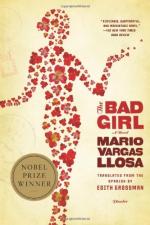|
This section contains 700 words (approx. 3 pages at 300 words per page) |

|
SOURCE: Smee, Sebastian. “Gauguin and His Gritty Granny.” Spectator 293, no. 9145 (15 November 2003): 54.
In the following review, Smee lauds Vargas Llosa's narrative techniques in The Way to Paradise, calling the work “elegant and involving.”
Sex has always been a stumbling block for Utopian-minded social reformers. They are attracted to the ideal prospect of ‘free love’ but tripped up by a tendency, seemingly inherent, for men to exploit women if their sexual drive is not held in check by so-called ‘bourgeois’ customs.
Mario Vargas Llosa's elegant and involving new novel [The Way to Paradise] is structured thematically around just such a dialectic. Its subject is the contrasting Utopian aspirations of two vivid historical figures who happened to have been related: Paul Gauguin and his grandmother Flora Tristán.
Gauguin most of us know something about (although many may not be aware that 2003 marks the 100th anniversary of his miserable death in...
|
This section contains 700 words (approx. 3 pages at 300 words per page) |

|


